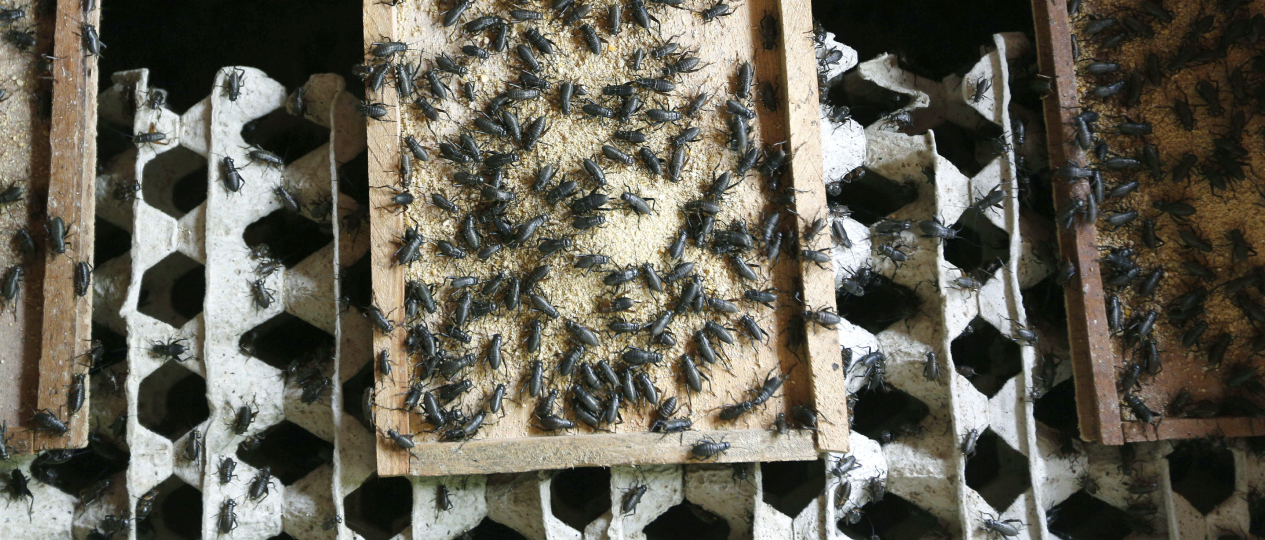
Insects can become a sustainable source of food for the Japanese, said the press office of Taiyo Green Energy Co.
Taiyo Green Energy Co. recently opened up a new market. Previously, the company produced electricity from sunlight and allowed the Japanese to grow vegetables at home.
Since 2017, a company from Saitama Prefecture (埼玉県) has been cultivating crickets, and in 2018 it signed the first contracts for their supply as food.
“We are committed to creating a sustainable source of food in Japan,” said Fumihiko Kojin. The President of Taiyo Green Energy is sure that for many people in the near future, insects will become an alternative to ordinary snacks, tasty and cheap.
The trend, originally aimed at bringing an “extraordinary delicacy” to the dining tables, is supported by the lower environmental costs of insect farming compared to livestock farming.
According to Ryota Mitsuhashi, product development official at Takeo, a Tokyo-based edible insect retailer, many Japanese companies have recently ventured into insect farming.
“To my knowledge, at least 26 corporations, including those that have just set plans to start cultivation, are operating in this market,” Mitsuhashi said. Some other firms breed housefly and silkworm larvae.
Experts are sure that the growth of the world’s population will lead to a shortage of beef, pork and other types of meat. And insects can come to replace them. Their cultivation is less painful for the environment, they also require less feed, water and energy. Cattle and pigs require many times more resources than insects.
Crickets are one of the main insect species cultivated in Japan. Farmers ship their produce frozen so retailers can boil and dry it – and sell it as snacks. Insect growers sometimes do all the processing themselves, from drying to crushing, so they can use them as raw materials for their brands’ snacks.
Takahito Watanabe, an associate professor of developmental biology at the University of Tokushima (徳島大学) who studies crickets, has founded his own start-up called Gryllus Inc. in Tokushima Prefecture (徳島県) in 2019.
Gryllus breeds crickets, bred at its production base, in plastic clothing containers. The process takes about a month. The company has an integrated production system, so it can dry and powder them by itself.
In late 2020, Gryllus developed an automated growing method that provides food and water, making growing less labor intensive. Last summer, she replaced all her feed with wheat bran and other food waste generated in the country.
“Insects are not something that only a certain group of people can consume, but a new source of protein that is more environmentally friendly,” Watanabe said. “Using domestically produced, otherwise discarded food is important as it will create a new cycle of reuse.”
The growing trend of insect farming is slowly approaching the point where there will be safety and hygiene restrictions. At the moment, government experts do not have the tools to assess the quality of such productions.
The Council Working Group on Public-Private Partnerships in Food Technology, established by the Ministry of Agriculture (農林水産省) in 2020, plans to start developing rules for the fledgling industry.
“Safety will be ensured by cultivating insects with proper methods based on scientific evidence,” said Yasuhiro Fujitani, head of the Ministry’s task force and staff member of the Research Institute for Environment, Agriculture and Fisheries, Osaka Prefecture (大阪府).
The working group is made up of experts from animal husbandry and agriculture, as well as officials from corporations that grow and sell insects.
The Ministry of Agriculture will confirm whether the proposed rules comply with the laws of the country.
“Countermeasures against infectious diseases, for example, will be necessary for insects, just like precautions taken to prevent the transmission of diseases to domestic animals,” said Yoshiki Matsumoto, a member of the Ministry’s working group and assistant professor of animal science at Kagawa University (香川). 大学).
“Japan has a well-established culture of collecting and eating insects, so experience in these areas will be useful,” said Matsumoto.






One comment
Anonymous User
16.08.2022 at 13:16
Very good write-up. I absolutely appreciate this site. Thanks!